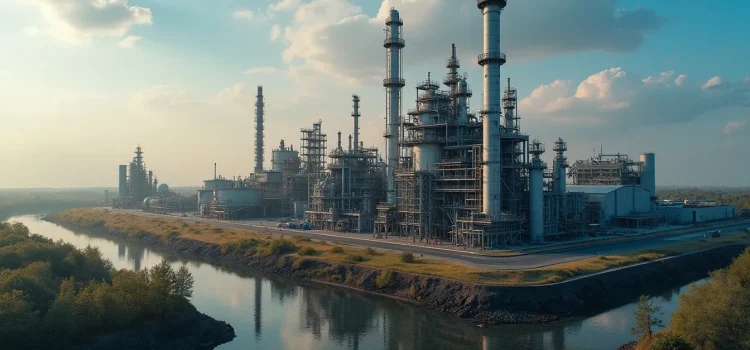

This article is an excerpt from the Shortform book guide to "The End of the World Is Just the Beginning" by Peter Zeihan. Shortform has the world's best summaries and analyses of books you should be reading.
Like this article? Sign up for a free trial here.
What’s the future of oil? How would global shipping disruptions affect energy supplies?
According to Peter Zeihan, oil makes worldwide transportation and shipping possible, and that presents a problem. In The End of the World Is Just the Beginning, he predicts a return to regional oil markets and widespread energy shortages. He explores these potentialities and their far-reaching consequences.
Continue reading to discover how oil dependence could lead to an energy crisis.
Peter Zeihan on Oil Dependence
While every commodity will be affected by restrictions on international shipping, those restrictions will compound themselves by limiting access to the resource that makes global transportation possible—oil. If international shipping falls apart, oil production will be drastically reduced, triggering an energy crisis. This scenario aligns with Peter Zeihan’s oil analysis, which emphasizes the geopolitical importance of energy resources in shaping global trade and power dynamics.
When it comes to shipping, global oil dependence means that any slight change in supply and demand can have dramatic effects on the cost of other goods. Zeihan anticipates a return to regional oil distribution markets similar to those of the imperial trading networks pre-globalization. Oil supplies will be restricted to whomever oil producers can safely ship it to. The US and Russia, with their internal oil fields, will be the least affected, but most of the world will suffer a severe energy crunch every time its oil deliveries are endangered. Since the US has enough oil for itself at home, it can no longer always be expected to protect the oil trade abroad.
(Shortform note: The global oil market is already experiencing fragmentation due to the EU and US bans on Russian oil imports, which went into effect just as Zeihan’s book was being published. The removal of so much oil from the global market caused prices to soar and started a major restructuring of the oil trade. In particular, this shift has made Europe more reliant on the US for energy and security. Meanwhile, there are reports that EU countries continue to purchase oil from Russia second-hand through Turkish oil distributors, demonstrating that the pressures to keep the oil market globalized are persistent.)
Zeihan reminds us that fossil fuels such as oil aren’t used only for transportation—natural gas generates electricity, and petrochemicals are the basis for many material goods, including medical supplies. Although “green” solutions are often proposed, they’re available only in countries with the right geography and climate. Renewable energy generation requires a lot of space and special conditions, and the cost for retooling our entire infrastructure to adapt to renewables is staggering. Renewable energy and substitutes for petrochemicals simply aren’t ready to replace fossil fuels at the scale we need, and the world will feel the coming oil shortages long before we have a viable substitute.
| The Nuclear Option It might be that the most viable answer to Zeihan’s energy problem isn’t “green” at all. In Apocalypse Never, Michael Shellenberger argues in favor of nuclear power as a fossil fuel alternative. The amount of nuclear fuel required to generate power is tiny next to how much fuel coal and gas plants burn, and while safety and construction costs have been an issue with older nuclear plants, modern designs are less costly, far safer, and last longer than those built decades ago. Also, unlike fossil fuel byproducts, nuclear waste isn’t released into the environment, but is disposed of in facilities designed to block the release of radiation. There are several issues with implementing nuclear power at scale around the world, the first being its public perception. Shellenberger argues that since the 1960s, some environmental groups have deliberately conflated nuclear power with nuclear fallout to stop plants from being built on lands they want to conserve. Another issue is the sourcing of fissionable uranium, which is mined in Kazakhstan, Canada, and other countries, then enriched into usable fuel at a handful of sites in Russia, Germany, France, China, and the US—another global supply chain. The last consideration is one of time—nuclear plants are costly and time-consuming to build, and the world will need a substitute for oil before a deglobalization crisis hits. |

———End of Preview———
Like what you just read? Read the rest of the world's best book summary and analysis of Peter Zeihan's "The End of the World Is Just the Beginning" at Shortform.
Here's what you'll find in our full The End of the World Is Just the Beginning summary:
- Why the golden age of international trade is about to end
- Why the collapse of international trade is the biggest threat to civilization
- How to prepare for tumultuous decades to come






